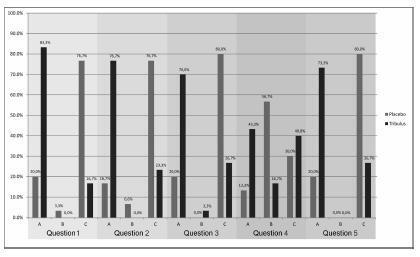Summary
Revista Brasileira de Ginecologia e Obstetrícia. 2020;42(1):26-34
03-27-2020
To assess the construct and criterion validity of the Postmenopause Sexuality Questionnaire (PMSQ).
The present methodological questionnaire validation study included postmenopausal women. The construct validity was tested by factor analysis and the criterion validity was performed using the correlation between the PMSQ and the Female Sexual Function Index (FSFI). The ROC curve was used to verify sensitivity, specificity and to determine the cutoff point of the PMSQ.
A total of 181 women with amean age of 56.4 ± 5.7 years old were evaluated. The exploratory factor analysis showed that the PMSQ presented Kaiser test = 0.88 and χ2 = 3293.7 (p < 0.001), commonalities ≥ 0.5, and extraction of 9 factors with eigenvalue ≥ 1; explaining 66.3% of the total variance. The PMSQ presented factor loadings between 0.4 and 0.8. A strong correlation between the 2 questionnaires (r = 0.79; p = 0.000) was shown. The cutoff point of the PMSQ was ≤ 55.5, assuming 87.9% sensitivity and 78.9% specificity (p < 0.001).
Since the PMSQ showed a strong correlation with the FSFI questionnaire, it presented good psychometric properties to assess the sexuality in postmenopausal women. Based on these results, the PMSQ could be widely tested as a specific instrument to examine the sexual function in postmenopausal women. Future studies, designed to examine the PMSQ instrument in different populations, are needed.
Summary
Revista Brasileira de Ginecologia e Obstetrícia. 2016;38(3):140-146
03-01-2016
The aim of this study was to study the effects of Tribulus terrestris on sexual function in menopausal women.
This was a prospective, randomized, double-blind, placebo-controlled clinical trial that included 60 postmenopausal women with sexual dysfunction. The women were divided into two groups, placebo group and Tribulus group, and evaluated by using the Sexual Quotient-female version (SQ-F) and Female Intervention Efficacy Index (FIEI) questionnaires.
There was no significant difference between the groups in age, age at menopause, civil status, race, and religion. In the evaluation with the SQ-F questionnaire, there were significant differences between the placebo (7.6±3.2) and Tribulus (10.2±3.2) groups in the domains of desire and sexual interest (p d" 0.001), foreplay (3.3±1.5 versus 4.2±1.0) (p d" 0.01), arousal and harmonious interaction with the partner (5.7±2.1 versus 7.2±2.6) (p d" 0.01), and comfort in sexual intercourse (6.5±2.4 versus 8.0±1.9) (p d" 0.01). There was no significant difference between the placebo and Tribulus groups in the domains of orgasm and sexual satisfaction (p = 0.28). In the FIEI questionnaire, there was a significant improvement (p < 0.001) in the domains of vaginal lubrication during coitus and/or foreplay (20 versus 83.3%), sensation in the genitalia during sexual intercourse or other stimuli (16.7 versus 76.7%), sensation in the genital region (20 versus 70%), sexual intercourse and/or other sexual stimulations (13.3 versus 43.3%), and the ability to reach orgasm (20% versus 73.3%). There was no significant difference in adverse effects between the two groups.
After 90 days of treatment, at the doses used, we found Tribulus terrestris to be effective in treating sexual problems among menopausal women.
